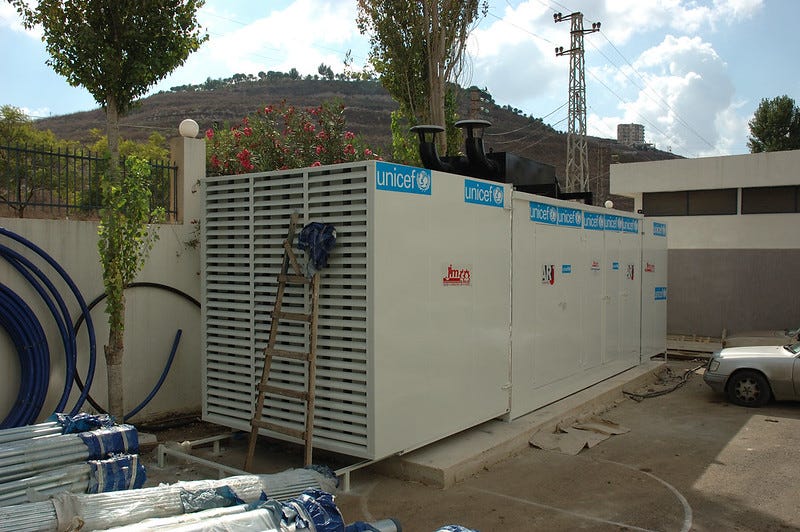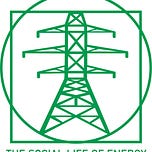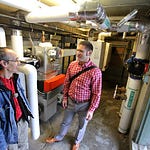Last week I teased my interview with Muzna and Neil about tackling corruption in the Lebanese electricity sector. They wrote the report about it (together with Ali Ahmad and Marc Ayoub). Last week you got the gist, but now, you can hear - or read - the whole interview! Find out more about what achieving reliable electricity meant for the people involved, about the intricacies of the political settlement and about how poor governance and poor uptake of renewable energy capacity hang together. (You can also listen to this podcast on Spotify, Apple, Stitcher or wherever you get your podcasts.)
Transcript
Today I’m taking you to Lebanon, to a story about how to do good in messy, murky circumstances. Here to tell the story are Muzna al-Masri and Neil McCulloch. They recently co-authored a report about a town in the Bekaa Valley, in the east of the country, a couple of stone throws away from Syria. The town is called Zahle, and it has 24-hour electricity, which is unfortunately unique in Lebanon. Responsible for the service is EDZ – short for Electricité de Zahle. They got a concession to operate in the town from the national utility, which is EDL, the Electricité de Liban. So, acronyms out of the way, if you’re curious about how they did it and what we might learn from it, welcome to the Social Life of Energy.
Neil
So the backgrounds of the research project is a research program by SOAS, the University of London, on anti-corruption evidence. And what they were interested to, to do was to try and understand why anti-corruption programs around the world have been so unsuccessful.
Neil
And their idea was that they've often failed because they have this sort of cookie cutter approach to anti-corruption, they have a common idea of the things you have to do to tackle corruption. And what they've pointed out and they've now accumulated a lot of evidence for this is that you really have to understand the nature of the underlying political settlement in order for to be able to tackle corruption in an effective way. Because countries are different. And the ways in which politics are work are different. And so they've done a whole set of studies, in particular in the electricity sector, looking at various types of reforms in Bangladesh, in Nigeria, and also our own study in Lebanon, to see how progress is possible within a different context. So our study looks at corruption in the electricity sector in Lebanon, which is infamous, as we all know, but explicitly how it was possible in the city was actually in its surroundings, to provide a reasonably good quality functional electricity service in an environment in a broader environment, which was very dysfunctional. How was that feasible in that in that political context?
Marten
Okay. Great, thanks. And Muzna can you speak a little bit more about what's going on in Lebanon, for those who don't know?
Muzna
Basically, in Lebanon electricity problem has been ongoing for many decades. There are constant electricity cuts in the city of Beirut, at a minimum would not have electricity three hours a day outside of Beirut, it's 12 to 14 hours a day. The corruption in the sector is huge. It is responsible for a large part of the national debt. And as a result there are a lot of private generators that are covering that kind of need in energy and but also causing a lot of air pollution and forcing most residents to pay huge electricity bills, both national one and kind of for private generators.
But there is one bright example, which is the EDZ the electricity of Zahle, which has managed to generate electricity 24 hour electricity, with excellent collection rates, with excellent quality of service. That is a huge contrast with the National situation. And at the same time has captured a lot of people's imagination. So how can EDZ do it? And if we can do it in one setting, can’t we all do that? We've actually been hearing this kind of question, can I do that in this refugee camp? Can we do that in Hamra? So in a way, our study answers this kind of global question on corruption, but also attempts to answer to the Lebanese people. Is it doable elsewhere?

Marten
Okay. So what is your most important finding or message that you've concluded from the research?
Neil
Um, I mean, the most important message, to my mind is the one that mostly just mentioned, which is that this is doable. But, reformers within Lebanon and reformers within of the international community have been banging their head against the brick wall of electricity reform in Lebanon for decades, exactly as Muzna says, and have mostly failed. And yet one city has managed to succeed. So the real question is, how, how is this possible? So the main message I take away from it is that if you have a really good understanding of how the local politics actually functions, it is possible to negotiate a solution, it is possible to make progress. However, what our study shows, which is a little bit uncomfortable, is that this is not a story of some heroic reformer doing all the right things against all the odds, it's a much messier, much more murky story than you might like to believe. Because EDZ has succeeded in part because of the failure of the Lebanese state. And it succeeded in part at the expense of the Lebanese state. So there's a downside to the story as well as an upside.
Muzna
Yeah, if I can continue on this, I think the main message for me is that in a country that has that amount of corruption, there is no way to come up with an arrangement that improves the quality of service for people without making concessions and sort of feeding the beast if you say, so you have to kind of pay some to the people who are responsible for the bad quality of service to start with. But then there is a way of minimizing these kinds of concessions you're making, by leveraging [political support].
Neil
And I think that's been one of the remarkable things of the story of Zahle is the way in which EDZ has managed to mobilize the community. They've funded sports clubs, they found a funded religious organizations, they've got the entire community around them campaigning and championing for them as a success. And then that is strengthening the political authority of EDZ to be able to battle the centre, which could have shut it down, which could have made what they were doing impossible, but they were so popular. And they knew that they could get people out in the streets to support them, that they allowed it to continue. So there's a very clever politicking going on there about achieving the outcome, but also exactly as Muzna said, in order to be able to come to, shall we say, compromises with those in the centre who might block it, you need to make you need it to make a profit, you need to make a surplus. And the way in which EDZ achieved that was I think, very clever. And it was the exact opposite of all of the international advice, the international advices make everything transparent. EDZ managed to make everything not transparent, and thereby managed to make a significant profit, which they could then plough back into investment into the quality of service and also into reaching settlements with the people who might oppose them.
Marten
Okay, so there was the puzzle at the start with like, how does EDZ do it? And I'm hearing two answers. One is community support. And the other one is making things less transparent. Maybe Muzna, you want to elaborate on that?
Muzna
I think the puzzle is more complex than that. I think the community support, if I may elaborate on that is not about just leveraging support. So we could like, as we did research, we kept on like discovering one layer after another of that kind of relationship. At first, I understood it as a straightforward sponsorship from EDZ to the community to get their support. But then, and we understand it, like, I understood it as clientelistic ties, and there is this kind of linkages of clientelism being negative, anti-democracy... And soon after, we realized, actually, they would support them anyway, and that sponsorship was much more complex than paying the community for EDZ to make a profit, you sort of pay the community, but they are on your side anyway. But by that payment, you can sort of collaborate with them, although you have the upper hand.
And that complex relationship is very important how EDZ operates it, in relation to the centre, to the national level political actors. So I would say it's a complex puzzle in the sense that the negotiations are in parallel with members of parliament who get maybe get a cut or profit in other ways, with a few providers who are tied to (wholeseale) national actors who have interest in continuing to sell diesel fuel. And so EDZ buys from them too. But also at the national level of employing local generator owners, so that they do not oppose the plan for generation by EDZ; getting the support of different kinds of sectarian players, so that the company is in line with the sectarian politics, and these elements together, that had EDZ negotiate a contract with the government that is to its interest, but also allows for better service.
Marten
Okay, thanks. Neil, can you maybe give an example of what you mean by making things less transparent? And maybe afterwards, we can think about implications of your findings, like what, what kind of policy advice, if you will, might one draw from this?
Neil
I'm not sure the policy advice is to make things less transparent. But just in terms of how that was done, it was very clever. So one of the fundamental problems with electricity supply across Lebanon has always been that the price that people pay for their electricity, the price per kilowatt hour is way, way below the cost of supplying that electricity. More than half of all of Lebanon's enormous debt is as a consequence of the deficit. so over the years of EDL, as a result of under paying for electricity, well, most people wouldn't say it was under paying because they received such a bad service. But it's a vicious circle, because they receive such a bad service, because no one can invest in it because they underpay. So, therefore, you've got this challenge, in order to be profitable, the price that people pay has to be more than the cost of supply. But if you were a politician, and you came along and said, ‘Hey, you know what, we're going to triple the price of electricity’, you would be booted out of office very quickly indeed. Nobody is going to do that.
But there is a willingness to pay more for electricity, people wanted a decent supply. And they particularly want electricity when they want electricity. They want to be able to switch it on and it works at any time of day. So therefore, there's a big latent demand for paying significantly more, a big willingness to pay as economists say, for paying significantly more for electricity, if it can be reliable.
What EDZ said did was they combined their bills in 2015, with those of the EDL. EDL will supply the electricity way below cost, very loss-making but that's EDL problem. And it's been purchased very cheap by EDZ. But then when the EDL electricity cuts off, as it does half of the time, maybe a third of the time. So then EDZ’s own generators would supply the electricity. But because there was one bill, you couldn't see what rate EDZ we're charging you. In fact, they were charging five to six times the rate of EDL. So while they're making that very, very tiny profit on the electricity that they're buying from EDL, they're making a huge profit of the electricity that we're selling from their own generators.

So because people could see what the underlying rate for their electricity was, but they wanted the electricity, they were willing to pay. And the overall bill size wasn't actually much bigger than they would have paid anyway, if they'd been paying a private generator. So they weren't personally harmed by this. In fact, sometimes the bills went down a little bit, sometimes they went up, it depends on people's personal circumstances. But suddenly, they were in a position where they get the electricity when they wanted the electricity. So by in a sense hiding the rates, EDZ was capable of supplying that electricity, when it wouldn't have been if it had been transparent about it. Now, the challenge going forward is, you can't hide forever. And so in terms of what you do, it would be perhaps a good idea if one has a similar sort of model to EDZ, a set of concessions at the city or regional level, which would allow generation, which would allow local concession operators to operate like this. But the price has to be regulated in order to be able to protect citizens. And whether there's a political deal to be done with citizens, that would enable people to pay a price that would allow the concessions to make sufficient money to be invested in the lines and the services that are necessary to provide a good quality service. I think that's a big open question. We don't know the answer to that.
Marten
Yeah, right. Muzna, anything that you want to add to that big question?
Muzna
Yeah, I think there are a couple of things that go in parallel but which are not about the technical questions themselves, like the discovery of how tied the feeling that I have 24 hour service, 24 hour electricity, how tied that is to a feeling of dignity, of respect. And that's a key impact. So there are the elements of ah, it's more comfortable, and it's good that I don't have the stress of thinking when should I turn on the AC and when do I turn off the washing machine, but also the feeling that I am respected as a resident in this place as a citizen. And in parallel to it is the success of EDZ that's probably unintended, but you can see it in the field, the success of EDZ, when contrasted to the failures of the state, often make people think that the state is bad, like we just want to privatize everything, whereas you have you have some successful examples in municipalities, for example, where the municipality owns the generator, regulates it, and the prices are very similar to the prices that EDZ [charged]. But the general understanding is, if EDZ succeeded, it's because it's a private company and so privatization is the solution. And I think this needs to be tackled a little bit because it's not that straightforward.
One side impact of the kind of illicit overhauling of the network and the provision of 24-hour service is the fact that they have a much higher percentage of energy generated from solar sources. So basically, they've encouraged mostly houses, farms and also several factories, to install solar PV panels that then they could buy the excess. electricity generated from that in the city. And that's that makes Zahle one of the highest cities in the country with solar power generation. So there was some potential there, maybe not exploited fully, especially because of the length of the contract and several other reasons. But that's one thing that may be is worth building on.
Neil
Can I just add a point on that? Because I'm really glad you mentioned that must know that Muzna. The challenge with renewables is that in order like all energy investments, in order to be able to recoup your investment, you have to be thinking long term. But the environment in which Zahle, and every other city in Lebanon is operating is that everything is short term in politics. So you might get a two year renegotiation, and another two year renegotiation, and now you have to do another deal, and so forth in order to negotiate your way and then navigate your way through the complex politics. And as a result, it's very difficult for them to make a long-term investment. So one of the things we've found from our study, from some of the conversations was that there was an opportunity to do significantly more renewables than they currently did. But that that couldn't be undertaken, because that would require a 20 year contract, and no one can think 20 years ahead in Lebanon. And that's a tragedy in a way. I mean, I find it ironic that we regard Zahle as a success, because they managed to put in place 64 emergency diesel generators, this is a big success. This would not be regarded as a success anywhere else in the world. These are big, dirty forms of generation. But just being able to supply reliable electricity is a huge success. But the next phase needs to be to shift over towards renewable cleaner generation, and that will require a longer term mindset and a greater stability to be able to make those sort of choices.
Marten
Okay. This sounds like a good message to send off our listeners, to think the importance of the longer term, let's say! Thank you, Muzna and Neil, for talking to me about this report.
Neil
Fantastic. Thanks, man.
Muzna
Thanks, Marten, for having us.













Share this post